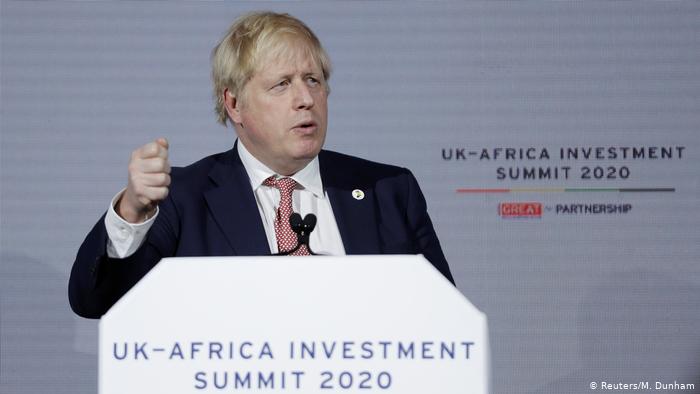 The UK Prime Minister, Mr Boris Johnson whilst addressing the 2020 UK-Africa investment summit made reference to the popular Akan proverb, all fingers are not the same to support his stance on Brexit.
The UK Prime Minister, Mr Boris Johnson whilst addressing the 2020 UK-Africa investment summit made reference to the popular Akan proverb, all fingers are not the same to support his stance on Brexit.
Mr Johnson addressing more than two dozen African leaders in an opening speech at UK-Africa investment summit in London said Brexit was ‘a new start’ for UK and for trade with other nations.
He promised that the UK’s new immigration policy will put “people before passports” as he used his first set-piece speech of 2020 to extol the benefits of trade with post-Brexit Britain to a major gathering of African leaders.
The prime minister said the UK was the “ultimate one-stop shop” for trade, education and tech.
“Look around the world today and you will swiftly see that the UK is not only the obvious partner of choice, we’re also very much the partner of today, of tomorrow and decades to come,” he said in a speech focusing more on general entreaties than specific policy ideas.
Johnson said people from African countries could benefit from the still-to-be detailed changes to the immigration system after Brexit, which will end the free movement of people to and from EU nations.
“You’ll be pleased to hear that one thing is changing – our immigration system,” Johnson said. “Change is coming, and our system is becoming fairer and more equal between all our global friends and partners, treating people the same wherever they come from.
“By putting people before passports we were will able to attract the best talent from around the world, wherever they may be,” he said.
“But in the words of an old Akan proverb that I picked up in Ghana, all fingers are not the same. There is wisdom in these Akan proverb. All fingers are not the same and all countries are not the same and the UK boasts … in expertise that cannot be matched by any other nation and that is why we are one of the biggest partners of the countries across Africa. Look at the billions of pounds worth in the deals that are being finalised just here today that we are announcing,” Mr Johnson said.
President Abdel Fatah al-Sisi of Egypt, President Uhuru Kenyatta of Kenya and President Nana Addo Dankwa Akufo-Addo of Ghana were among the 15 African leaders at the event.
As well as Johnson, the foreign secretary, Dominic Raab, the international development secretary, Alok Sharma, the trade secretary, Elizabeth Truss, and the business secretary, Andrea Leadsom, were also attending – as was Prince Harry.
Johnson used his speech to present Bexit as “a new start” for the UK and for trade with other nations.
“Look around the world today and you will swiftly see that the UK is not only the obvious partner of choice, we’re also very much the partner of today, of tomorrow and decades to come,” he said.
“We want to build a new future as a global free-trading nation. That’s what we’ll be embarking on, on 31 January.”
Johnson also promised a sustainable approach to trade and aid, saying the UK had almost eliminated its use of coal for energy as it moved to greener sources.
“But there’s no point in the UK reducing the amount of coal we burn if we then trundle over to Africa and line our pockets by encouraging African states to use more of it,” he said.
“So from today the British government will no longer provide any new direct development assistance for thermal coal mining or coal power plants overseas. Not a penny more of UK taxpayers’ money will be directly invested in digging up coal or burning it for electricity.”











